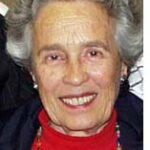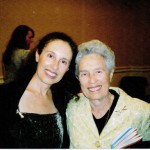
By Eileen Wingard
SAN DIEGO –I spent the entire month of October on the East Coast, book-ended by two concerts featuring my younger sister, Violinist Zina Schiff. On Saturday evening, October 2, in the New England Conservatory’s excellent Jordan Hall, Zina performed the Sibelius Violin Concerto with the Longwood Symphony under the direction of Jonathan McPhee, who also conducts the Boston Ballet Orchestra. For many in the audience, this was their first opportunity to hear Zina play. One could sense the enchantment as Zina’s captivating sound spun its magic.
In a review in the Boston Phoenix, Jeffrey Gantz wrote that those who did not attend “missed a performance of the Sibelius Violin Concerto that compared favorably with the one the Boston Symphony offered in 2005. Which is saying something, since the BSO’s guest conductor back then was Paavo Berglund, who at a frail 76 was still arguably the world’s greatest living interpreter of Sibelius… Berglund’s soloist approached the concerto as a European virtuoso vehicle, a la the Beethoven, the Brahms, or the Tchaikovsky, she sounded like a tourist in the primaeval forest of Berglund’s Tapio…Jascha Heifetz protégée and new Boston resident Zina Schiff,,, melted into McPhee’s opening shimmer, a vulnerable, Lemminkainen-like hero listening to the woodland and responding. Her tone could be angular, even sinewy, but her phrasing was weighted, and she gave it an almost Gypsy swing…McPhee…got some glorious low-register fanfares out of the orchestra, but what was most gratifying about the performance was the room he and Schiff made for each other.”

Among the audience that night was the New England Conservatory’s well-known faculty member, violist Kim Kashkashian, who came backstage to introduce herself and compliment the soloist. Also backstage was Yehudi Wyner, retired composition professor from Brandeis University. Son of Lazar Weiner, the Yiddish Art Song composer, Wyner was the winner of Italy’s prestigious Prix de Rome and his Piano Concerto was awarded a Pulitzer Prize. A prolific composer, he also performs chamber music and collaborates with many fine instrumentalists such as clarinetist Richard Stoltzman and violinist James Buswell III. Wyner was effusive in his praise of Zina’s performance. “Even with the orchestra at its loudest, your beautifully focused tone came through.”
At the end of my Eastern Seaboard stay, I spent three days in Northampton with Rabbi Yechiael Lander and his wife Rose. Rabbi Lander was the Hillel rabbi at Amherst when my youngest Harriet was a student there. In recent years, he helped establish the Lander-Greenspoon Day School where Rabbi Philip Graubart of La Jolla’s Beth El was involved before coming to Southern California. Rose Lander is a leading Suzuki violin teacher. I enjoyed talking shop with her and sitting in on several of her lessons.
Thanks to excellent publicity, generated by the Landers and the Smith College Music Department, Smith College’s Sweeney Concert Hall was full. Among the audience were all six rabbis of the Pioneer Valley. Concert Pianist Lory Wallfisch, who underwrites this yearly concert in memory of her husband, the celebrated violist Ernst Wallfisch, returned the day before the program from presenting master classes at Menuhin’s school in Switzerland. She was thrilled by Zina’s program. “You should be playing in all the concert halls of Europe,” she exclaimed. To escape the Nazis, the Wallfisches were rescued from Romania by the great violinist, Yehudi Menuhin.
Zina’s program, called “Soul Songs: In Tribute to Henrietta Szold,” related the musical selections to the life of that outstanding Jewish-American woman, founder of Hadassah, who was recently inducted into the National Women’s Hall of Fame.
Zina tied together the program with an engaging narrative. Many of the selections were by Jewish composers, Paul Kirman, Paul Ben-Haim, George Gershwin. Those ties were easy to make. But she cleverly included Johannes Brahms’ Sonata No. 3 and Pablo de Sarasate’ Zigeunerweisen, drawing parallels between Szold’s unrequited love for the younger scholar, Louis Ginsburg and the unrequited love between the younger Brahms’ and the widowed Clara Schumann. As for Zigeunerweisen, Zina related that fiery conclusion of her program to the Szold family’s Hungarian background, pointing out that Hungarian gypsy music was part of Henrietta’s heritage.
Zina and her sensitive, master collaborator , Cameron Grant, solo pianist with the NYC Ballet, rewarded the tumultuous applause and standing ovation with an encore, Hora , by the Israeli composer Marc Lavry. The connection to Szold was obvious.
After the concert, the comment heard most often was “What a great violinist! Why haven’t we heard of Zina Schiff before?”
*
Wingard is a retired violinist with the San Diego Symphony Orchestra and a freelance writer